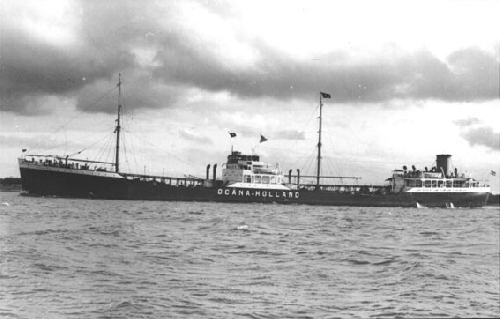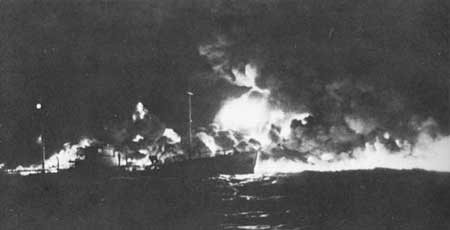Ocana
Dutch Motor tanker

| Name | Ocana | ||
| Type: | Motor tanker | ||
| Tonnage | 6,256 tons | ||
| Completed | 1938 - Wilton-Fyenoord NV, Rotterdam | ||
| Owner | NV Petroleum Mij ´La Corona´, The Hague | ||
| Homeport | The Hague | ||
| Date of attack | 25 Mar 1942 | Nationality: | |
| Fate | Sunk by U-552 (Erich Topp) | ||
| Position | 42° 36'N, 64° 30'W - Grid CB 1363 | ||
| Complement | 56 (52 dead and 4 survivors). | ||
| Convoy | |||
| Route | Curaçao (14 March) - Halifax | ||
| Cargo | 8500 tons of motor spirit and kerosene | ||
| History | Completed in March 1938. On 2 Nov 1941, the Ocana was damaged by a near miss from a bomb dropped by a German aircraft while in convoy FN-40 off Spurn Point. | ||
| Notes on event | At 08.13 hours on 25 March 1942 the unescorted Ocana (Master Jacob Besier) was hit on the port side between #3 and #4 tanks by one torpedo from U-552 about 70 miles southeast of Cape Sable, Nova Scotia. The U-boat had chased the tanker for 20 hours over a distance of more than 150 miles as the ship thwarted three attack attempts between 04.10 and 06.40 hours. Apparently the U-boat had been spotted on the surface in the moonlight and each time U-552 tried to get into a favorable attack position the Ocana turned towards her at full speed and the U-boat had to crash dive to avoid being rammed or fired upon. Topp waited for the moonset with his next attack but then barely avoided a collision with the ship, passing her stern in a distance of only 5 meters and finally fired the torpedo that hit the tanker which immediately burst into flames after being hit. The Germans identified the ship by her distress signals and due to the proximity of the coast the U-boat did not wait for the ship to sink and left the area.
The surviving crew members were trapped on the forward part of the tanker because burning gasoline quickly spread the fire over the whole aft part and also floated on the sea surrounding the ship. Only the starboard forward lifeboat remained intact, but it was launched poorly and was swamped when it hit the water bow first. Several men boarded the boat and sat in freezing water after attempts to bail it out failed. Many were suffering from burns and soon one after another died during the night and was washed overboard. USS Mayo (DD 422) had heard the distress signals from Ocana and arrived at the scene about four hours after the torpedo hit, picking up four survivors and one body in 42°36N/64°25W. The survivors were the chief engineer officer, the second and third engineer and a British anti-aircraft gunner, who were all suffering from exposure, burns, contusions and frostbite. The master was also rescued from a raft, but died shortly after being taken aboard. The destroyer proceeded to Argentia where the men were taken to a hospital on 26 March. In the meantime, the Canadian auxiliary patrol vessel HMCS Fleur de Lis (J 16) (T/Lt J.W. Dowling, RCNR) sailed from Shelburne after the Canadian fishing vessel Robertson I reported that a ship had been torpedoed south by east from Cape Roseway and further reports by aircraft about a burning tanker in this vicinity. Later that day, the US fishing vessel Joffre recovered eight bodies from the water after spotting flares burning on their lifebelts. At 21.30 hours, the patrol vessel located the Ocana which was still burning fiercely and carried out a search for survivors but only found two capsized lifeboats, a raft and another boat with the badly burned bodies of two officers and five crewmen in it. The next morning, a boarding party led by the first lieutenant of HMCS Fleur de Lis was transferred to the tanker after the fire had subsided sufficiently to bring the fires under control and to secure a towing line. They found the vessel abandoned, the entire superstructure gutted by fire, no lifeboats left in the davits and two charred bodies, but the engine room was intact as were the tanks forward of the bridge and the two tanks abaft on the starboard side full of petrol. Three towing attempts were made, the boarding party returning after each time due to the hazardous conditions aboard from smoldering fires. The Canadian tug Ocean Eagle (Master William A. Poole) escorted by the Canadian patrol vessel HMCS Charny (Z 26) (Lt E.R. Shaw, RNCR) were sailed from Shelburne to assist but they proceeded to Halifax after being unable to find the ships. During the morning of 28 March, the unescorted British motor tanker Dolabella (Master D.T. Keddie) was asked for assistance by HMCS Fleur de Lis in 41°22N/64°19W and eventually four officers from the tanker went aboard Ocana to check if her main engines could be started and to prepare her for towing. However, after the towing hawser fouled badly on the forecastle head of HMCS Fleur de Lis and had to be cut, the Dolabella was ordered to proceed to Halifax after her crew members returned due to the danger of U-boat attacks during the night. Shortly thereafter, HMCS Chedabucto (J 168) (T/Lt J.H.B. Davies, RCNR) arrived but soon had to leave again as she was low on fuel. In the evening of 29 March, HMCS Fleur de Lis had to return to Shelburne in deteriorating weather for fuel and water and left Ocana drifting to the southwest at 1 knot in 41°30N/64°33W. She sailed again the next morning together with the Canadian tug North Wind but the heavy weather forced them to turn back. For days air and surface searches carried out by HMCS Fleur de Lis, HMS Roxborough ( I 07) (Lt V.A. Wight-Boycott, RN), HMCS Goderich (J 260) (T/Lt R.R. Kenney, RCNR) and HMCS Regina (K 234) (T/Lt R.S. Kelley, RCNR) failed to find any trace of the drifting Ocana and she was already presumed lost when she was spotted and reported by the Norwegian motor tanker Garonne in 42°03N/63°46W at 00.20 hours on 8 April. HMCS Fleur de Lis again sailed from Shelburne to locate the drifting wreck and eventually found her in the afternoon of 9 April. 26 hours later, the Ocean Eagle escorted by HMCS Halifax (K 237) (LtCdr C. Copelin, RNCR) arrived from Halifax and took the Ocana in tow after a boarding party of seven men from the corvette went aboard. They found eight feet of water in the engine room and were unable to start the engines, all woodwork throughout the ship were completely destroyed by fire, the rudder was jammed hard to starboard and the 4” gun on the stern was trained and loaded. The vessels got underway but were unable to make much headway as the tanker was difficult to control with its jammed rudder. Furthermore the Canadian tug Foundation Aranmore escorted by the Canadian auxiliary patrol vessel HMCS Laurier (Chief Skipper D.E. Freeman, RCNR) were sent from Halifax, but during the night a strong gale forced the tug to slip tow and the ships all lost contact to each other in snow squalls and thick fog the next morning. They all returned to port except HMCS Halifax which relocated Ocana at 11.00 hours on 12 April and was relieved by HMCS Burlington (J 250) (LtCdr W.J. Fricker, RCN) from Halifax in the afternoon. At dusk on 13 April, the Foundation Aranmore escorted by HMCS Laurier and HMCS Fleur de Lis arrived from Shelburne but towing operations were postponed until daylight after a first attempt to take Ocana in tow failed. The next morning, a boarding party of eleven men from HMCS Laurier went aboard to secure two hawsers and the towing commenced with a speed of 3 knots at 13.00 hours, a steadying line held by HMCS Laurier helped to steer the tanker in moderate wind and sea. HMCS Fleur de Lis then left to meet the tug Security off Shelburne and to escort her to the tanker. On 15 April, the Ocana was finally in tow of two tugs and proceeded at a speed of 4 knots towards Shelburne. At 00.45 hours on 16 April, the tanker suddenly sank rapidly by the stern until only her bow, from stem to foremast with a list to port remained above water, the stern resting on the bottom in 31 fathoms of water about 28 miles east-southeast of Cape Roseway. The tugs were escorted to Shelburne by HMCS Laurier while HMCS Burlington endeavored to scuttle the wreck by firing 17 rounds from the 3” gun into the bow. As the wreck of Ocana in position 43°23’30N/64°42W proved to be a navigational danger for other ships, it was dispersed by depth charges dropped from HMCS Laurier in the evening on 19 April. Skipper Howard Desmond George Bould, the man in charge of the boarding party from HMCS Fleur de Lis who extinguished the fire aboard Ocana, was awarded a Mention in Despatches and promoted to Chief Skipper in January 1943 for displaying outstanding qualities of leadership and devotion to duty. | ||
| On board | We have details of 56 people who were on board. | ||
If you can help us with any additional information on this vessel then please contact us.

